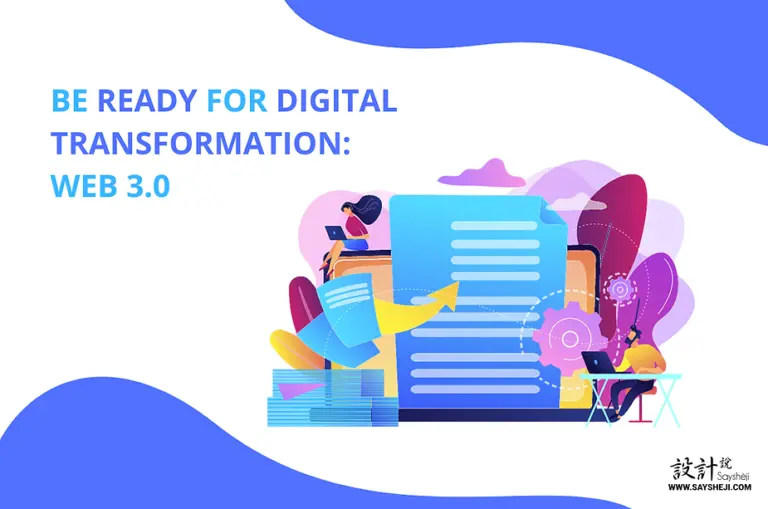Digital Transformation is a popular buzzword as traditional businesses struggle to find a foothold in a changing landscape that typically does not favor the business models of incumbents. It’s frightening for all stakeholders including owners, shareholders, managers, employees and customers. Thus, one can understand the desire to change things up to meet the demands of a digital future.
Website ready
In the Web 3.0 era, the digital world will be a place where you can do what you want and be anything you want to be. It’s going to be a world where reality and virtuality are seamlessly integrated. The Web 3.0 era brings new types of entrepreneurs who can create their own avatars which they can use in the virtual world and in real life.
The future of the web is not something that we can predict but we can think about how it will evolve and what will be the role of our business in this new world. As entrepreneurs, we should think about how our skill sets can help us in Web 3.0 and make sure that we are ready for any changes that this new era might bring.
For example, entrepreneurs can now use web 3.0 to create engaging, interactive and immersive content which has a significant impact on the way users consume content. With new technologies like augmented reality, virtual reality, 360-degree videos and so on, it has become easier for entrepreneurs to create a personalized experience for their audience. Besides, blockchain also evolved into a system for storing data in general. This means it can be used to store anything from medical records and academic data to content marketing materials. Web 3.0 will store all the information on the blockchain rather than in one central location like Google or Facebook.
Value Proposition
Web 3.0 is a personalizable place with intelligent search and behavioral advertisements where content is generated by machines rather than human beings. It’s a world where virtual items or information become more valuable than physical items.
Traditional user acquisition is more about pushing products out to the market and letting people know, whereas Web 3.0 is about attracting users by share values. The user and blockchain are loosely coupled, the user is a “plug-in”, inserted in the blockchain project as part of the ecosystem. For example, in NFT world, users can monetize their ideas by being creative. In crypto, the important thing is the economic incentive mechanism.
Customers have always been looking for more utility from their purchases and they always will. That’s never going to change. It’s their expectations of what is a meaningful value that do change constantly. For example, web 1.0 provide richer standardized offerings at a lower cost, web 2.0 provided more variety of experiences and web 3.0 provide more customized experiences at low cost. This means Web 3.0 era will be able to transcend the utility-price tradeoff in a big way. As modularization reaches deeper and deeper into existing assets, smaller and smaller chunks of value will become available for trade. This means a huge leap for customer value propositions to the point of true mass custom experience offerings provided at scale.
Payment Integration
The infrastructure of Web 3.0 is divided into software and hardware, covering payment, storage, domain names, node service and many other spaces. Take the gaming industry as an example, traditional game companies tend to extract users’ value, making players deposit money in games to achieve powerful or fancy items. In Web 3.0 era, users are required to contribute their time and effort to the ecosystem, but they can earn tokens in return by playing games.
Another example is Metamask, the digital assets in the Metamask are completely self-hosted, avoiding any risk related to privacy disclosure or asset loss on centralized platforms. With decentralized wallets, users can manage their assets autonomously by authorizing protocols voluntarily.
Why do businesses like blockchain? It is because blockchain reduces cost. By using blockchain, organizations no longer need to pay third-party vendors or mediators to verify trading partners. And also won’t have to review so much documentation to complete a transaction because everyone will have permission to access a single and immutable version. Besides, blockchain enhanced security. Every transaction is recorded according to the consensus method. The security is so enhanced that each node of the blockchain holds a copy of a transaction and its history. So it is very difficult for hackers to compromise the transaction data. Lastly, it improved traceability. In the traditional e-commerce process, it is challenging to trace goods. This can lead to several complications, including theft, and loss of items. Blockchain enables every party to track the products and ensure that it is not being replaced or misused during the supply chain cycle.
Why WEB 3.0 helps in the digital transformation of business?
Web 3.0 is the future of doing business online. It helps in the digital transformation of businesses from their current state to a more advanced version. There are many reasons why Web 3.0 is important for digital transformation in the coming years:
1. More personalized business to customer interactions:
Web 3.0 allows more personalized interaction on the internet with the implementation of artificial intelligence and machine learning. Users will have more freedom and control over customized browsing and permissionless access.
2. Better search assistance:
Voice search technology powered by artificial intelligence will provide humanized digital search assistants to users for a better internet experience.
3. Ownership of your data:
Web 3.0 will reduce the reliance on centralized repositories and allow users to own their data and digital footprints as tokenized digital assets. There will be no accountability of other platforms for data usage. It also reduces the dependency of intermediaries with mutual ownership and governance.
4. Greater privacy and security:
The rise of Web 3.0 will result in the rise of peer-to-peer connectivity that will help in greater privacy and security while sharing more data.
5. Enhance trust:
With more freedom, control, security, and privacy, Web 3.0 will enhance the overall trust value of internet services. The semantic web will reduce the dependency on intermediaries and repositories that will make businesses future-proof for technological adoption and advancement.





